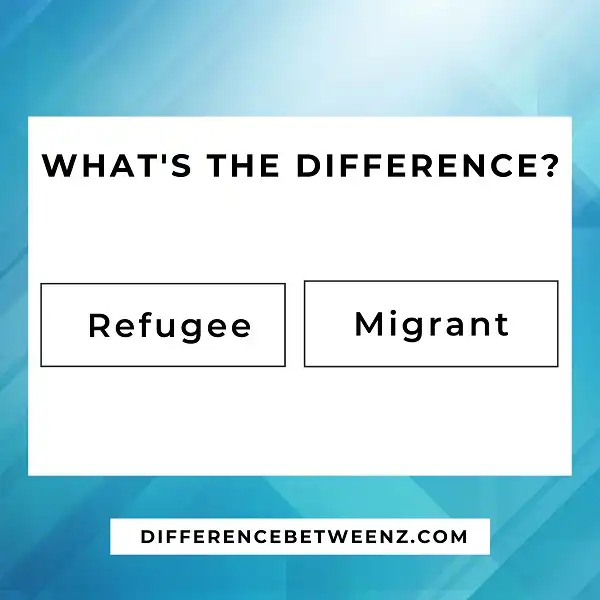Millions of people around the world are displaced, many of them fleeing war-torn countries and seeking refuge in other nations. But what’s the difference between a refugee and a migrant? Are they interchangeable terms? In this blog post, we’ll explore the definition of each term and highlight some key differences. We’ll also discuss why it’s important to understand the distinction.
Who is Refugee?
Refugee is a person who is forced to leave their country due to war, violence, or persecution. Refugee status is typically granted to people who have fled their country because of fears of persecution based on race, religion, political opinion, or membership in a particular social group. More than 25 million people around the world have been forced to flee their homes due to conflict or persecution. Refugee status is different from asylum seekers, who are people who have not yet been granted refugee status but are seeking it. Refugee status is also different from internally displaced persons (IDPs), who are people who have been forced to leave their homes but have not crossed an international border. IDPs are often able to return home when the conflict ends, but refugees often cannot.
Who is a Migrant?
- Migrant is a word with multiple meanings. In its most basic sense, a migrant is somebody who moves from one place to another, usually in search of better economic opportunities. This type of migration has always been a feature of human society, and it continues to play an important role in the world today. According to some estimates, there are currently more than 200 million migrants around the world.
- However, the word ‘migrant’ can also be used to refer to specific groups of people who have been forced to leave their homes due to conflict or persecution. In recent years, Europe has seen a sharp increase in the number of refugees and asylum seekers arriving on its shores. Many of these people are fleeing conflict zones in the Middle East and Africa, and they are often referred to as ‘migrants’.
- The term ‘migrant’ is therefore polysemous – that is, it has multiple meanings. It can refer to anybody who moves from one place to another, but it is also often used specifically to refer to groups of people who have been forced to leave their homes due to conflict or persecution.
Difference between Refugee and Migrant
- Refugee and migrant are often used interchangeably, but there is a big difference between the two words. A refugee is someone who has been forced to flee their country due to conflict or persecution.
- A migrant, on the other hand, is someone who chooses to leave their country in order to find better economic opportunities elsewhere. This distinction is important because it highlights the different motivations of these two groups of people.
- Refugees are typically in need of protection, while migrants are typically seeking opportunity. As a result, refugees are often entitled to special rights and protections under international law. This is not the case for migrants, who are typically treated as economic migrants and subject to different rules.
Conclusion
The definition of a refugee is someone who has been forced to flee their home country due to persecution, war, or violence. A migrant, on the other hand, is someone who chooses to move in order to improve their life situation. It’s important to understand the difference between these two terms because they are often used interchangeably and can have very different implications. Refugees deserve our compassion and support as they rebuild their lives, while migrants should be treated with respect and dignity regardless of their reasons for moving.


